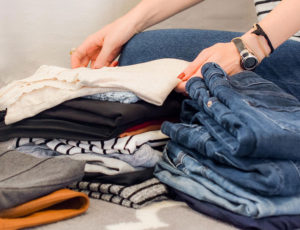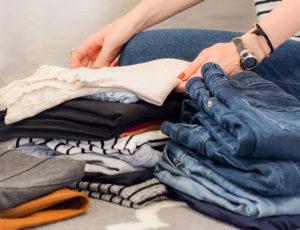
Textiles 2030: UK Sustainable Textiles Action Plan – an ambitious 10-year programme for clothing and textiles – officially launched on 26 April. WRAP, the UK’s leading sustainability charity, is behind the new agreement for the textiles industry.
Over the next decade, the voluntary agreement will slash the environmental impact of both UK clothing and home fabrics through practical interventions along the entire textiles chain.
Textiles 2030 has secured commitment from over 18 major brands and retailers, 26 re-use/recycling organisations and 21 affiliates. This means the agreement is supported by over half the UK market at launch; nearly 60% of clothing placed on the market (by sales volume) by UK retailers comes under the agreement.
Major household names signed up to Textiles 2030 include ASOS, Boohoo, Dunelm, John Lewis, M&S, New Look, Next, Primark, Sainsbury’s, Ted Baker, Tesco and also The Salvation Army.
Commenting is Marcus Gover, CEO of WRAP. “I’ve been impressed by the way business has committed to reducing the environmental impact of its products and striving for net zero. They clearly see this as core to their business models and essential for building back better as they recover from the pandemic.
“We have been working with business to develop Textiles 2030 to drive forward the sector-wide change needed to redress how we use textiles. Our research shows that public demand is there for clothes made more sustainably and not disposable fashion, so the time is right for this transformation.
“Textiles 2030 will create a fashion sector fit for the future and lower the environmental impacts of other household textiles. This is just the beginning of a decade-long programme. We need more companies to show their commitment to their customers through Textiles 2030. With clothing having the fourth largest impact on the environment after transport, housing and food, we simply cannot afford for sustainability not to be the next big thing in fashion.”
WRAP is also unveiling the Textiles 2030 Roadmap, which will direct the actions under Textiles 2030.
This sets out both the water and carbon reduction targets. Also, the key milestones and activities necessary to introduce circular use of textile products and materials at scale.
The Textiles 2030 Roadmap shows what signatories must do to deliver the targets. This includes key outcomes by the end of 2022, 2025 and also 2030. These actions will transform the UK’s make-use-dispose fashion culture into one where products are made sustainably, used longer and then re-used or recycled.
The Target-Measure-Act approach will allow textiles businesses to set tough targets, measure impact and also track progress; both on an individual business basis and towards national targets and public reporting.
The Textiles 2030 environmental targets are:
- Cut carbon by 50%; sufficient to put the UK textiles sector on a path consistent with limiting global warming to 1.5°C. This is in line with the Paris Agreement on climate change and achieving Net Zero by 2050 at the latest.
- Also, reduce the aggregate water footprint of new products sold by 30%.
Roadmap ambitions for circular textiles that partner signatories will join forces to achieve are:
- Design for Circularity. Agree good practice principles including durability, recyclability, use of recycled content and minimising waste. Implement them as appropriate to their business model and customer base to lower the impact of product placed on market in the UK.
- Implement Circular Business Models. Pilot reuse business models as appropriate to their product ranges. Share learning and develop large-scale implementation to extend the lifetime of clothing in the UK. Also, decouple business growth from the use of virgin resources.
- Close the Loop on Materials. Set up partnerships to supply and use recycled fibres for new products; therefore accelerating the commercialisation of fibre-to-fibre recycling in the UK.
Footprint modelling shows that these three actions towards circularity could deliver half of the climate target.
Textiles 2030 is also being supported by Baroness Young of Hornsey OBE. The Crossbench peer and Chancellor of the University of Nottingham is an advocate for sustainable textiles. Baroness Young says; “We urgently need to protect the planet from the damaging, unsustainable impact of the way we produce and consume clothing and textiles. Innovation, creativity and commitment, underpinned by collaboration, are essential if we are to be successful.
“By working together, businesses across the UK can take the critical steps needed to transform business practices in the sector for good and achieve our climate goals. With WRAP’s expertise in delivering initiatives such as Textiles 2030, and with the sector’s knowledge and expertise, I am excited by the impact we can achieve together. I urge every fashion and textiles business in the UK to sign up to Textiles 2030.”
Textiles 2030 builds on the foundation of the SCAP 2020 voluntary agreement (Sustainable Clothing Action Plan).
This saw businesses respond to growing public demand for fashion with a softer environmental footprint; adopting robust measurement and targeted action. SCAP was successful in helping signatories achieve as well as surpass the water and carbon targets.
The UK’s Textiles 2030 is the first national agreement in what will become a global network of initiatives, under the new Textiles Action Network, to reduce the environmental impact of clothing around the world.
For further information on Textiles 2030, please click here.








